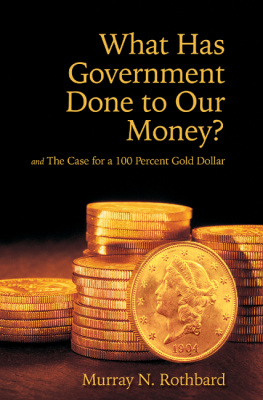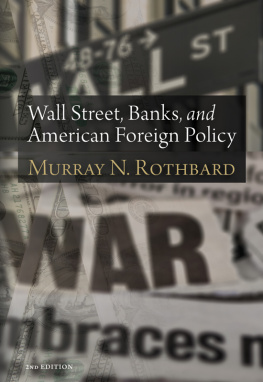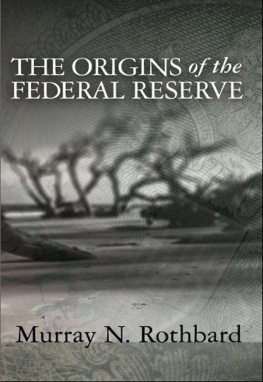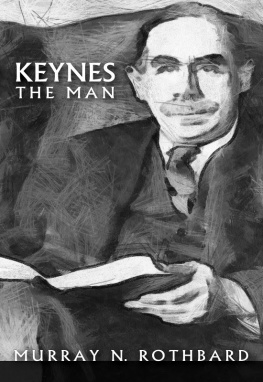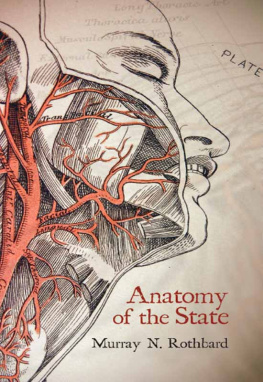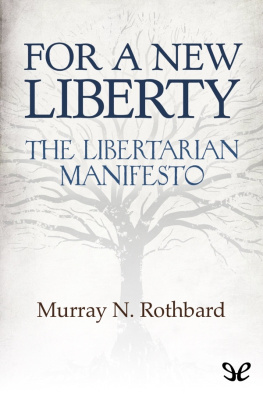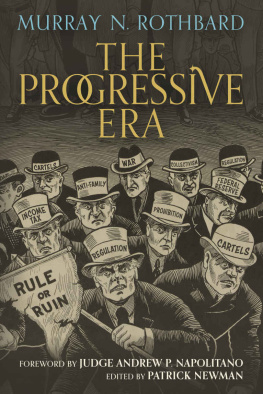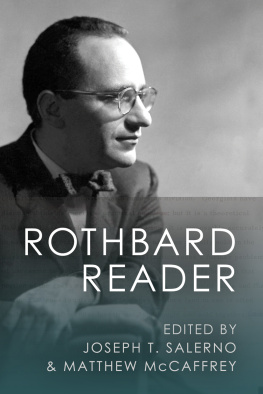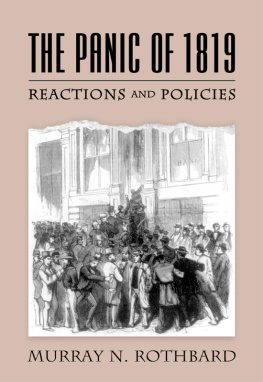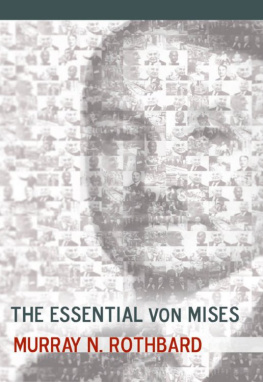Rothbard - What Has Government Done to Our Money?
Here you can read online Rothbard - What Has Government Done to Our Money? full text of the book (entire story) in english for free. Download pdf and epub, get meaning, cover and reviews about this ebook. publisher: Ludwig von Mises Institute, genre: Science. Description of the work, (preface) as well as reviews are available. Best literature library LitArk.com created for fans of good reading and offers a wide selection of genres:
Romance novel
Science fiction
Adventure
Detective
Science
History
Home and family
Prose
Art
Politics
Computer
Non-fiction
Religion
Business
Children
Humor
Choose a favorite category and find really read worthwhile books. Enjoy immersion in the world of imagination, feel the emotions of the characters or learn something new for yourself, make an fascinating discovery.
What Has Government Done to Our Money?: summary, description and annotation
We offer to read an annotation, description, summary or preface (depends on what the author of the book "What Has Government Done to Our Money?" wrote himself). If you haven't found the necessary information about the book — write in the comments, we will try to find it.
What Has Government Done to Our Money? — read online for free the complete book (whole text) full work
Below is the text of the book, divided by pages. System saving the place of the last page read, allows you to conveniently read the book "What Has Government Done to Our Money?" online for free, without having to search again every time where you left off. Put a bookmark, and you can go to the page where you finished reading at any time.
Font size:
Interval:
Bookmark:

Copyright 1991, 2005, 2008 Ludwig von Mises Institute
Copyright 1963, 1985, 1990 by Murray N. Rothbard
Copyright 2005 Ludwig von Mises Institute, fifth edition
All rights reserved. Written permission must be secured from the publisher to use or reproduce any part of this book, except for brief quotations in critical reviews or articles.
Published by Ludwig von Mises Institute, 518 West Magnolia Avenue, Auburn, Alabama 36832.
ISBN: 978-1-933550-34-3
INTRODUCTION
FEW ECONOMIC SUBJECTS ARE more tangled, more confused than money. Wrangles abound over tight money vs. easy money, over the roles of the Federal Reserve System and the Treasury, over various versions of the gold standard, etc. Should the government pump money into the economy or siphon it out? Which branch of the government? Should it encourage credit or restrain it? Should it return to the gold standard? If so, at what rate? These and countless other questions multiply, seemingly without end.
Perhaps the Babel of views on the money question stems from man's propensity to be realistic, i.e., to study only immediate political and economic problems. If we immerse ourselves wholly in day-to-day affairs, we cease making fundamental distinctions, or asking the really basic questions. Soon, basic issues are forgotten, and aimless drift is substituted for firm adherence to principle. Often we need to gain perspective, to stand aside from our everyday affairs in order to understand them more fully. This is particularly true in our economy, where interrelations are so intricate that we must isolate a few important factors, analyze them, and then trace their operations in the complex world. This was the point of Crusoe economics, a favorite device of classical economic theory. Analysis of Crusoe and Friday on a desert island, much abused by critics as irrelevant to today's world, actually performed the very useful function of spotlighting the basic axioms of human action.
Of all the economic problems, money is possibly the most tangled, and perhaps where we most need perspective. Money, moreover, is the economic area most encrusted and entangled with centuries of government meddling. Many peoplemany economistsusually devoted to the free market stop short at money. Money, they insist, is different; it must be supplied by government and regulated by government. They never think of state control of money as interference in the free market; a free market in money is unthinkable to them. Governments must mint coins, issue paper, define legal tender, create central banks, pump money in and out, stabilize the price level, etc.
Historically, money was one of the first things controlled by government, and the free market revolution of the eighteenth and nineteenth centuries made very little dent in the monetary sphere. So it is high time that we turn fundamental attention to the life-blood of our economymoney.
Let us first ask ourselves the question: Can money be organized under the freedom principle? Can we have a free market in money as well as in other goods and services? What would be the shape of such a market? And what are the effects of various governmental controls? If we favor the free market in other directions, if we wish to eliminate government invasion of person and property, we have no more important task than to explore the ways and means of a free market in money.
MONEY IN A FREE SOCIETY
The Value of Exchange
HOW DID MONEY BEGIN? Clearly, Robinson Crusoe had no need for money. He could not have eaten gold coins. Neither would Crusoe and Friday, perhaps exchanging fish for lumber, need to bother about money. But when society expands beyond a few families, the stage is already set for the emergence of money.
To explain the role of money, we must go even further back, and ask: why do men exchange at all? Exchange is the prime basis of our economic life. Without exchanges, there would be no real economy and, practically, no society. Clearly, a voluntary exchange occurs because both parties expect to benefit. An exchange is an agreement between A and B to transfer the goods or services of one man for the goods and services of the other. Obviously, both benefit because each values what he receives in exchange more than what he gives up. When Crusoe, say, exchanges some fish for lumber, he values the lumber he buys more than the fish he sells, while Friday, on the contrary, values the fish more than the lumber. From Aristotle to Marx, men have mistakenly believed that an exchange records some sort of equality of valuethat if one barrel of fish is exchanged for ten logs, there is some sort of underlying equality between them. Actually, the exchange was made only because each party valued the two products in different order.
Why should exchange be so universal among mankind? Fundamentally, because of the great variety in nature: the variety in man, and the diversity of location of natural resources. Every man has a different set of skills and aptitudes, and every plot of ground has its own unique features, its own distinctive resources. From this external natural fact of variety come exchanges; wheat in Kansas for iron in Minnesota; one man's medical services for another's playing of the violin. Specialization permits each man to develop his best skill, and allows each region to develop its own particular resources. If no one could exchange, if every man were forced to be completely self-sufficient, it is obvious that most of us would starve to death, and the rest would barely remain alive. Exchange is the lifeblood, not only of our economy, but of civilization itself.
Barter
Yet, direct exchange of useful goods and services would barely suffice to keep an economy going above the primitive level. Such direct exchangeor barteris hardly better than pure self-sufficiency. Why is this? For one thing, it is clear that very little production could be carried on. If Jones hires some laborers to build a house, with what will he pay them? With parts of the house, or with building materials they could not use? The two basic problems are indivisibility and lack of coincidence of wants. Thus, if Smith has a plow, which he would like to exchange for several different thingssay, eggs, bread, and a suit of clotheshow can he do so? How can he break up the plow and give part of it to a farmer and another part to a tailor? Even where the goods are divisible, it is generally impossible for two exchangers to find each other at the same time. If A has a supply of eggs for sale, and B has a pair of shoes, how can they get together if A wants a suit? And think of the plight of an economics teacher who has to find an egg-producer who wants to purchase a few economics lessons in return for his eggs! Clearly, any sort of civilized economy is impossible under direct exchange.
Indirect Exchange
But man discovered, in the process of trial and error, the route that permits a greatly-expanding economy: indirect exchange. Under indirect exchange, you sell your product not for a good which you need directly, but for another good which you then, in turn, sell for the good you want. At first glance, this seems like a clumsy and round-about operation. But it is actually the marvelous instrument that permits civilization to develop.
Consider the case of A, the farmer, who wants to buy the shoes made by B. Since B doesn't want his eggs, he finds what
Font size:
Interval:
Bookmark:
Similar books «What Has Government Done to Our Money?»
Look at similar books to What Has Government Done to Our Money?. We have selected literature similar in name and meaning in the hope of providing readers with more options to find new, interesting, not yet read works.
Discussion, reviews of the book What Has Government Done to Our Money? and just readers' own opinions. Leave your comments, write what you think about the work, its meaning or the main characters. Specify what exactly you liked and what you didn't like, and why you think so.

